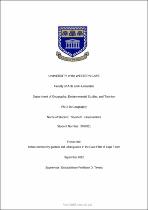| dc.contributor.advisor | Tevera, Daniel | |
| dc.contributor.author | Kanosvamhira, Tinashe P. | |
| dc.date.accessioned | 2022-08-01T08:17:56Z | |
| dc.date.issued | 2022 | |
| dc.identifier.uri | http://hdl.handle.net/11394/9180 | |
| dc.description | Philosophiae Doctor - PhD | en_US |
| dc.description.abstract | Cities worldwide are undergoing neoliberal transformation processes, culminating in deep
income inequalities, erosion of public space, and the depletion of social fabric across distressed
communities. The process of neoliberalism has coincided with a renaissance of urban
community gardens across the globe. This has been apparent, especially during financial crises,
due to the failure of the capitalist system. Such crises have resulted in various unemployed and
distressed citizens engaging in urban gardening activities for several reasons. Traditionally, the
literature has observed that the motivations behind urban community gardening were to address
the people's immediate needs such as food security and nutrition. | en_US |
| dc.language.iso | en | en_US |
| dc.publisher | University of the Western Cape | en_US |
| dc.subject | Neoliberalism | en_US |
| dc.subject | Activism | en_US |
| dc.subject | Unemployment | en_US |
| dc.subject | Urban gardening | en_US |
| dc.subject | Food security | en_US |
| dc.title | Urban community gardens and urban justice in the Cape Flats of Cape Town | en_US |
| dc.rights.holder | University of the Western Cape | en_US |
| dc.description.embargo | 2023 | |

